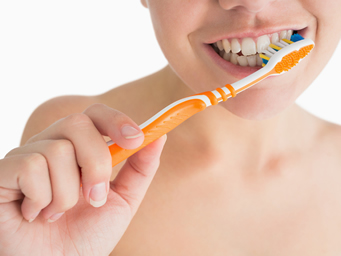
By: P. Piero D.D.S.
 In order to maintain overall health in children with obesity, it requires parents and health care providers to monitor the child’s oral health as well. The reason is that there is a link between periodontal disease and obesity in children.
In order to maintain overall health in children with obesity, it requires parents and health care providers to monitor the child’s oral health as well. The reason is that there is a link between periodontal disease and obesity in children.
There are more and more sugared drinks available to children today than ever before. Plus the drinking habits of today’s child are different than a few decades ago. Young adults like to consume sugared sodas, power drinks and fruit juice substitutes. The calories ingested have a lot less vitamin C and calcium and are empty calories. Even “healthy”- 100% juices or milk given to children in bottles and sippy cups when very young contributes to the problem. The shelves for snack foods and “breakfast” foods overflow with high sugar, high carbohydrates choices. You can be duped into the low-fat push that makes you think that you are making a smart choice for your child. Unfortunately, low fat or fat free on a package means higher sugar content. This contributes to obesity as well as periodontal issues.
As adolescents soda, gummy bears (or more appropriately gummy worms), cookies, fruit rollups and gum are the addictive source of dental decay, childhood obesity, and diabetes.
The lack of physical activity and exercise is also a problem with today’s youth and contributes to obesity. Time spent in front of the television and on the computer increase each year.
There are a couple of explanations for the link between obesity and periodontal disease. One thought is through the pathway of insulin resistance. Sara Grossi, director of the UB Periodontal Disease Research Center and lead author of a study at the School of Dental Medicine at the University at Buffalo said, “Now we see a relationship between obesity, insulin resistance and periodontal disease in a large, population-based cohort. This relationship is significant because obesity is an important risk factor for Type 2 diabetes and heart disease.” When you are obese, your body produces more cytokines. These cytokines trigger your body to fight infection and produce insulin resistance. The same happens with periodontal disease. Another hypothesis, not yet proven, for the link between obesity and periodontal disease is that the bacteria from gum disease may be interfering with fat metabolism.
It is important that you child receives regular professional cleanings every six months. The symptoms of periodontal disease can go unnoticed until the disease is advanced. The disease can escape a parent, but a dentist can diagnose it in the early stages.
Through methodical and meticulous oral cleaning at home and at the dental office, you and your children can control periodontal disease. Brushing twice a day and flossing once a day assists. However, flossing is a laborious task for children (and adults), so most don’t. As a parent it is important to find a way to support the experience, make it an expectation and a part of a twice daily routine. There are more and more studies that show that oral health is critical to total health, even at a very young age.
– Dr. Piero, a practicing dentist for over twenty five years, is the inventor of Dental Air Force. Articles published are on periodontal health related to heart disease, respiratory health, diabetes, strokes, and other systemic diseases. He is the Executive Editor for Journal of Experimental Dental Science, a contributing author to Hospital Infection Control: Clinical Guidelines and soon-to-be published book, Put Your Money Where Your Mouth Is.
